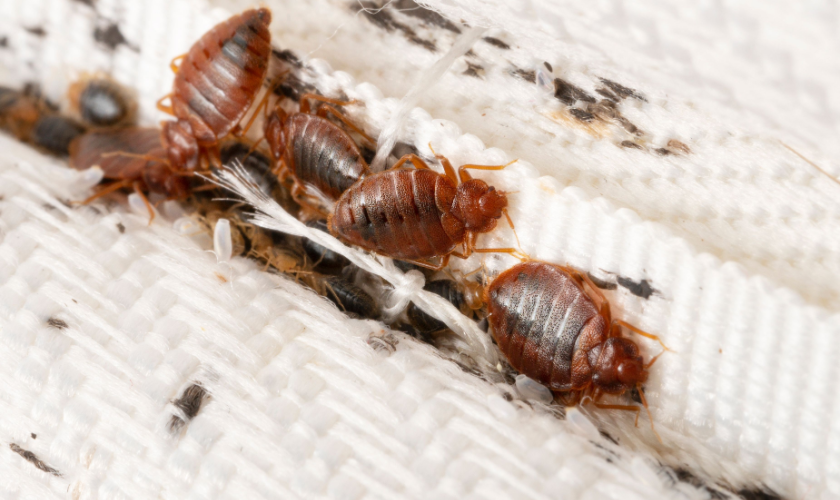Leading Kings Cincinnati Bug Control Services: Exterminator Knowledge
Leading Kings Cincinnati Bug Control Services: Exterminator Knowledge
Blog Article
Kinds of Bug Control: Which Approach Is Right for Your Infestation?
When encountered with a parasite infestation, the option of a suitable technique for insect control is crucial in properly handling the situation. By exploring the different types of insect control approaches readily available, individuals can make informed decisions tailored to their unique conditions, making sure an extra reliable and lasting outcome in pest eradication.
Chemical Bug Control
Chemical parasite control involves making use of artificial or normally derived chemicals to handle and eradicate pest populations properly. This approach is generally made use of in agriculture, forestry, and household setups to deal with a large range of pests, including weeds, rodents, and insects. The use of chemical pesticides can offer quick and targeted remedies to pest infestations, making it a preferred option for numerous individuals and services.
One of the vital advantages of chemical bug control is its capacity to quickly get rid of parasites, reducing the risk of damages to crops, property, and human health and wellness. By utilizing details chemicals that target particular parasites, this technique can properly regulate infestations while lessening damage to helpful organisms and the environment when applied properly.
Nevertheless, using chemical insect control additionally elevates issues regarding potential negative effects on non-target varieties, water sources, and human health and wellness. It is crucial to adhere to safety and security guidelines, use chemicals sensibly, and take into consideration alternate bug control approaches to reduce these dangers and ensure lasting pest monitoring practices.
Organic Bug Control
Organic insect control, likewise called biocontrol, uses living organisms to take care of and lower insect populaces naturally. This method uses the power of nature to control parasites without the demand for synthetic chemicals. Biocontrol can involve the introduction of natural adversaries of the insect varieties, such as parasites, microorganisms, or killers, to reduce parasite populations. By utilizing the bug's all-natural killers or virus, organic bug control offers a eco-friendly and lasting service to pest monitoring.

Mechanical Insect Control
Utilizing physical and hands-on approaches to manage parasite populations, mechanical parasite control offers an alternative strategy that does not rely on making use of living organisms or artificial chemicals. This method entails using barriers, traps, or other tools to physically discourage or remove bugs. By blocking bug entry factors or setting up catches to capture them, mechanical bug control can successfully decrease invasions without presenting chemicals into the environment.
One usual example of mechanical pest control is the usage of mesh displays on doors and windows to avoid insects from entering buildings. This simple yet reliable approach acts as a physical obstacle, keeping bugs out while enabling correct air flow. In addition, gadgets like mousetraps, fly swatters, and ultrasonic repellents drop under the mechanical bug control group.
While mechanical insect control methods can be labor-intensive and require routine surveillance and maintenance, they use a environmentally friendly and lasting solution for managing parasite invasions. By integrating different mechanical strategies, homeowner can develop a comprehensive parasite control technique that minimizes reliance on chemical pesticides.
Physical Parasite Control

Some usual physical insect control methods consist of making use of barriers such as screens or internet to stop parasite entry, traps to catch and eliminate parasites, and hand-picking to physically remove parasites from plants or structures. Furthermore, techniques like warmth therapies can be made use of to control parasites like bed pests by elevating the temperature to degrees that are dangerous to the insects.
Physical parasite control is specifically helpful in integrated bug monitoring (IPM) methods, where several insect control techniques are integrated for effective bug administration while decreasing using chemicals. By utilizing physical parasite control methods, individuals can successfully address bug infestations with minimal ecological influence.
Integrated Parasite Monitoring
When carrying out physical insect control approaches as part of bug administration approaches, Integrated Pest Administration (IPM) becomes a thorough method that leverages numerous methods to successfully regulate pest populations. IPM focuses on long-lasting prevention of insects via a mix of biological, social, physical, and chemical tools tailored to particular bug issues. By integrating numerous control techniques, IPM intends to lessen the threats related to insects while additionally decreasing reliance on chemical options.
One key facet of IPM is the emphasis on surveillance and examining pest populations to identify the most ideal control approaches. This aggressive strategy enables early treatment and targeted approaches, leading to extra efficient pest administration. In addition, IPM advertises eco-friendly practices by focusing on non-chemical Kings pest control cincinnati oh control approaches and only utilizing pesticides as a last option.
Final Thought

By utilizing the pest's all-natural killers or virus, biological parasite control uses a sustainable and eco friendly remedy to pest monitoring. - Kings best pest control cincinnati
Utilizing manual and physical methods to manage bug populations, mechanical parasite control uses an alternative method that does not depend on the use of living microorganisms or artificial chemicals.An efficient approach to managing insect populations without counting on chemical or biological techniques includes the usage of physical bug control methods.When applying physical bug control methods as component of insect monitoring methods, Integrated Bug Administration (IPM) arises as a detailed technique that leverages different strategies to efficiently regulate pest populations. Chemical insect control involves the usage of chemicals, organic parasite control uses all-natural predators, mechanical insect control includes physical obstacles, physical bug control consists of trapping or getting rid of bugs, and incorporated bug management combines multiple methods for a holistic approach to pest control.
Report this page